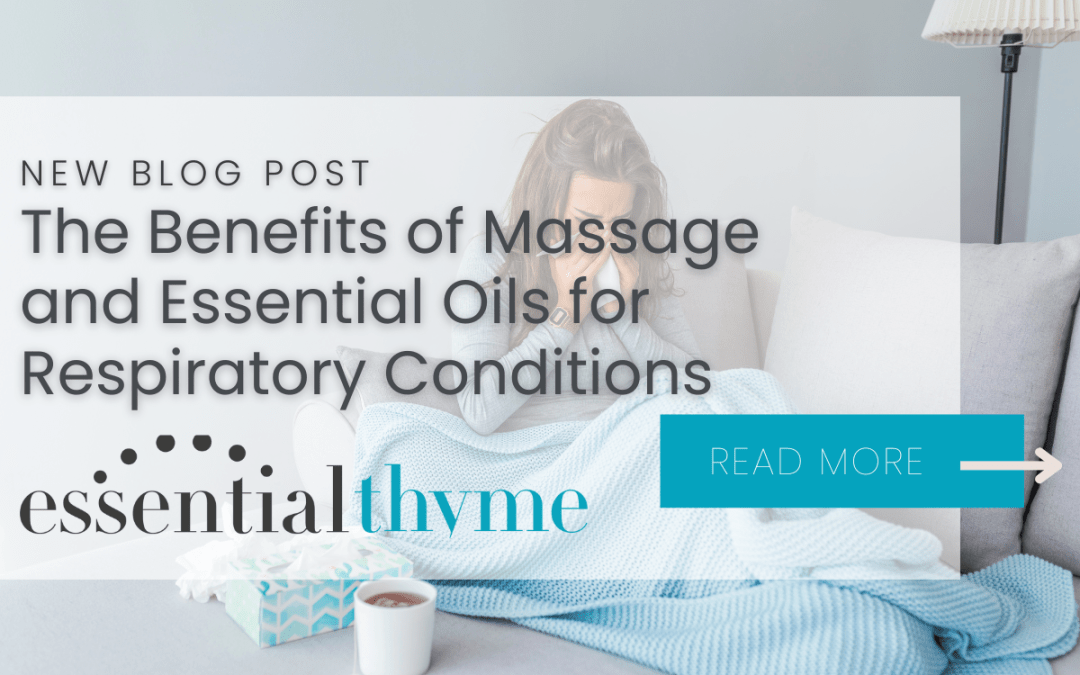As the days grow shorter and the colder months creep in, many people find themselves more susceptible to respiratory issues such as colds, flu, asthma, or bronchitis. These conditions can lead to discomfort and difficulties in breathing, impacting overall well-being. While medical treatment is essential, there are natural complementary therapies, such as massage and the use of essential oils, that could provide relief and help manage symptoms.
In this blog, we’ll explore how massage therapy and essential oils could support respiratory health, particularly during the colder seasons.
The Impact of Respiratory Conditions on the Body
Respiratory conditions can range from mild seasonal ailments, like the common cold, to more chronic problems such as asthma or chronic obstructive pulmonary disease (COPD). These conditions often cause inflammation, congestion, and tightness in the chest, making breathing more difficult and leading to general discomfort and fatigue.
While medication and prescribed treatments are crucial for managing severe respiratory conditions, complementary therapies could offer additional relief, especially when it comes to alleviating symptoms like tight chest muscles, congestion, and anxiety that often accompany breathing difficulties.
How Massage Can Help with Respiratory Conditions
Massage therapy may not be the first solution that comes to mind for respiratory issues, but it offers several benefits that can positively impact lung function and overall respiratory health.
Reduction of Muscle Tension
One of the primary benefits of massage is its ability to relieve tension in the muscles, particularly in the neck, shoulders, and upper back. Many people with respiratory issues tend to develop tightness in these areas as a result of shallow breathing or coughing. Massage could help loosen the muscles around the ribcage, which in turn allows for deeper and more effective breathing.
Improved Circulation
Massage stimulates blood flow throughout the body, including the lungs. This increased circulation helps to oxygenate the blood and improve the efficiency of the respiratory system. Better circulation means that essential nutrients and oxygen can reach the tissues faster, promoting overall healing and improved lung function.
Stress and Anxiety Reduction
Dealing with respiratory issues can be stressful, and stress often exacerbates the symptoms of asthma or bronchitis. Massage therapy promotes relaxation by reducing levels of the stress hormone cortisol and boosting the production of serotonin, the body’s natural feel-good hormone. By helping to calm the mind, massage may reduce the severity and frequency of stress-induced asthma attacks or breathing difficulties.
The Role of Essential Oils in Respiratory Health
Essential oils have been used for centuries in traditional medicine to support respiratory health. When used correctly, essential oils can help clear airways, reduce inflammation, and even fight off infections that affect the lungs.
Eucalyptus Oil
One of the most popular oils for respiratory issues, eucalyptus oil is known for its anti-inflammatory, antiviral, and decongestant properties. When inhaled, eucalyptus helps to open up the airways by breaking down mucus and reducing inflammation in the respiratory tract. It’s particularly effective when dealing with colds, sinus infections, and bronchitis.
Peppermint Oil
Peppermint oil contains menthol, which has a cooling effect and can provide relief from nasal congestion and headaches. The oil is also known to relax the muscles of the respiratory tract, which can help ease breathing in those suffering from asthma or other chronic lung conditions.
Lavender Oil
Lavender oil is celebrated for its calming effects and ability to reduce stress. It’s also a natural anti-inflammatory, making it helpful for soothing irritated airways. Its relaxation-promoting effects particularly benefit individuals with respiratory symptoms worsened by anxiety or stress.
Tea Tree Oil
Tea tree oil is a powerful antimicrobial that can help fight off respiratory infections caused by bacteria, viruses, or fungi. It’s often used to reduce sinus congestion and can be diffused in the air or applied topically (diluted) to help clear the nasal passages.
Using Massage and Essential Oils Together
Combining massage therapy with essential oils can amplify the benefits for those suffering from respiratory conditions. This blend of therapies is often referred to as aromatherapy massage..
Here’s how the two work together:
Clearing the Airways:
Inhale essential oils like eucalyptus or peppermint during massage to break up congestion and improve airflow. A therapist may also massage the back with diluted essential oils to directly target the muscles involved in breathing.
Boosting Relaxation:
Oils such as lavender or chamomile can be used to calm the nervous system, helping to alleviate stress that often accompanies respiratory conditions. This, combined with massage, can help individuals breathe easier by reducing muscle tension and anxiety.
Enhanced Healing:
Tea tree or eucalyptus oils can be massaged into the back or feet to stimulate the immune system and speed up the body’s recovery process from infections like the cold or flu.
While massage and essential oils should not replace traditional medical treatments for respiratory conditions, they can serve as powerful complementary therapies. By promoting relaxation, improving circulation, and helping to clear congestion, these natural methods can enhance respiratory health and overall well-being, especially during the colder months.
Whether you’re struggling with a chronic condition like asthma or simply seeking relief from seasonal congestion, incorporating massage and essential oils into your wellness routine may provide the support you need to breathe easier. Always consult with a healthcare professional before beginning any new therapy, especially if you have a pre-existing condition, as the use of essential oils for people with respiratory conditions can be detrimental to health if not used correctly.
At Essential Thyme, we offer bespoke massage treatments and aromatherapy to help alleviate respiratory symptoms. Book a session with us and discover the benefits for yourself.

